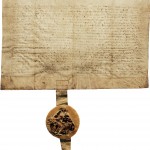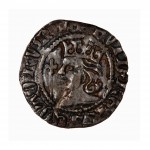Charter of King David II (reigned 1329 – 1371) confirming the charter of King Alexander II granting to his Burgesses of Stirling a weekly market, a merchant guild and other privileges. Given at Scone 26th October 1360
Stirling was one of the first Royal Cities created in Scotland. It was granted Burgh status by King David I along with Edinburgh, Perth, Roxburgh, Berwick, Dunfermline and Scone sometime between 1124 and 1127. Burgh status elevated an existing settlement into something distinctive. The King granted his Burgesses or Freemen privileges; they held their land and property directly from him, they had the right to elect a Council, levy local taxes, have trade incorporations and hold markets. Such privileges allowed the town to prosper and made a special connection between the King and his subjects in the town that had not existed before.
It is now thought likely that the original creation of the Burgh by David I was given as a verbal instruction and therefore no written charter exists for the original grant of Burgh status to Stirling. This document, issued by David II in 1360, is the first surviving charter that we have. It represents part of the continuation of the special relationship between the King and his Burgesses of Stirling as it shows the King confirming the privileges of the town, citing the wording of earlier grants as he does so.
“ we have granted and by our charter confirmed to our burgesses of Strivelyn a market day in our burgh of Strivelyn… We grant also to our said burgesses of Strivelyn that they shall have a merchant guild…”
It is as part of this special relationship between Crown and Burgh that the Provost and Councillors came into being. This document represents the beginning of an administrative continuum that has lasted in Stirling until today.

